Semrush is our favorite SEO tool for keyword analysis, competitor analysis, and much additional. It helps the USA to detect new growth opportunities and optimize content within the exact way to bring additional traffic from search engines.
There are several alternative software on the market that supply similar services however nobody will doubt that Semrush is way higher than them. it’s the potential to try and do no matter what it takes to boost your business, like finding additionally profitable, less competitive keywords, providing steering on a way to use them properly, scrutinizing competitors’ ways, etc.
As a website owner, you will have used Semrush a minimum of once within the journey thus ought to be acquainted with all of those things. thus you’ve got a transparent plan of a way to use it to boost your organic traffic, build backlinks, fix website problems, and others. Right?
Semrush has recently fresh its style to create it visually appealing. the company has updated the brand and added additional options to allows you to meet new SEO challenges. a couple of the latest integrations are also introduced to simplify your content optimization and boost earnings.
These changes failed to happen overnight. Semrush consultants have conducted many months of research and created frequent interactions with influencers around the world to collect their concepts. Improved search algorithms to give you additional accurate and in-depth information across the bundles.
Today, I’m going to analyze Semrush’s latest updates and check whether it’s worth investing in 2021
What is SEMrush
SEMrush is an All-in-one Marketing Toolkit that provides data insights about your own online presence and content, and also, your competitors as well. By leveraging this tool you’re able to:
- Audit your online presence and enhance based on recommendations
- Audit your competitor's online presence and beat them at their own game.
As we go in 2021 and beyond, search engines (predominantly Google) have stressed the importance of providing a stronger user a better. By auditing your own organization additionally to competitors, you’ll be ready to develop quality content that stands the check of time.
Who is Semrush for?
Semrush offers 40+ tools and reports from different SEO and digital marketing specializations, such as:
- Keyword research
- On-page SEO
- Technical SEO
- Competitor analysis and monitoring
- Content marketing
- Local SEO
- Rank tracking
- Social media management
- Link building
- Market analysis
- Paid advertising
As you can see, Semrush has got you covered in every area of digital marketing and SEO. You can learn more about all of the Semrush features on their website.
Pricing & Plans
SEMrush has 3 pricing plans available with an array of upgraded features, as you continue to grow your account.
- Pro that costs $119.95 per month or $99.95 if billed annually
- Guru that costs $229.95 per month or $191.62 if billed annually
- Business that costs $449.95 per month or $374.95 if billed annually

If you’re turned off by the price, even their least expensive plan provides more than enough features for you to get started and grow your business.
The takeaway: The insight that SEMrush provides makes it well worth the price. Any organization that is serious about growing its business, via its online presence, should be using it.
Semrush Features
- Auditing
- Performance Metrics
- Dashboard
- Campaign Management
- Analytics
- SEO Management
- Alerts/Notifications
- Analytics / ROI Tracking
- Distribution Management
- Social Media Monitoring
- Social Media Metrics
- Benchmarking
- Automated Publishing
- Multi-Account Management
- Website Monitoring
- Channel Attribution
- Website Analytics
- Publish Scheduling
- Google Analytics Integration
- Ad Optimization
- Backlink Management
- Broken Link Discovery
- Link Analytics
- Keyword Search
- Keyword Tracking
- Templates
- Competitor Analysis
- Link Management
- Localization
- Mobile Search Tracking
- Rank Tracking
- Keyword Research Tools
- Social media management
- Audience Targeting
- Trend Analysis
- Content Management
- Backlink Quality Check Tool
- Competing Product Analysis
- Post Scheduling
- Brand Management
- Categorization / Grouping
- Editorial Calendar
- Multi-Channel Publishing
- Referral Source Tracking
- Ranking Monitoring
- URL Builder
Keyword Research
In this section, I will tell you more about each keyword research tool that is available in the Semrush set of SEO tools.
Keyword Overview
The Semrush Keyword Overview tool lets you perform a full analysis of any given keyword to decide whether you want your website to start competing for it. You can analyze up to 100 keywords at one time.
Semrush has the largest database in the market which consists of 20B keywords, 14M suggestions for a single word, and 142 country databases.
You can find the tool under SEO > KEYWORD RESEARCH > Keyword Overview. All you need to do is enter the keyword or keywords you want to research, choose the country, and hit Analyze.
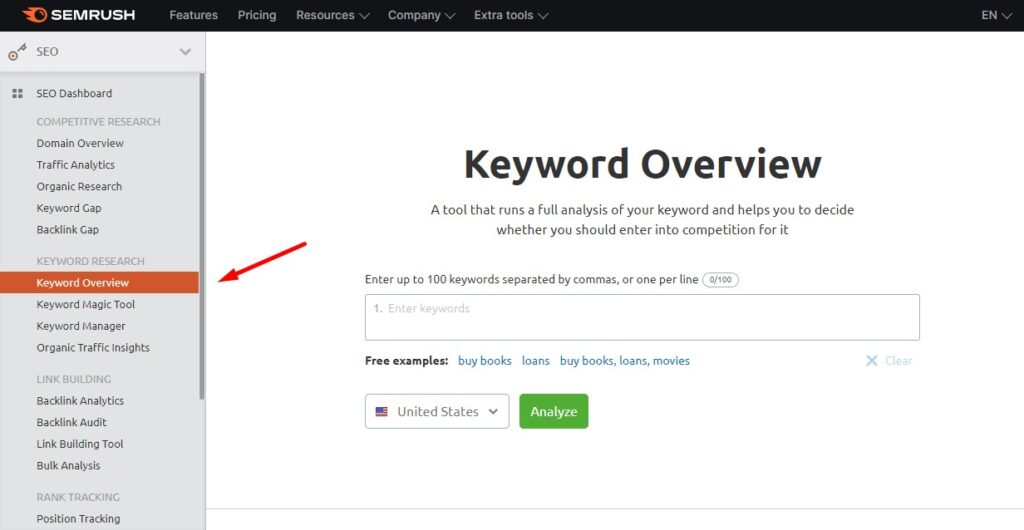
You will now see a very clean and well-structured overview of the keyword you entered. The Keyword Overview tool will display the following keyword metrics and data:
- Volume (average monthly number of searches over the last 12 months), Keyword Difficulty (between 1-100%), CPC (an average price that advertisers pay for a click), and Competition (level of competition between advertisers on a scale from 0 to 1.00)
- Global Volume (a total number of searches for a given keyword in all databases)
- Results on SERP (a number of URLs displayed in organic results for a given keyword), SERP Features (any additional types of search results that appear for a given query), PLA (top product listing ads that appear for the query), and Ads (the top ads that appear for the keyword)
- Trend (the interest in the keyword analyzed over the last 12 months)
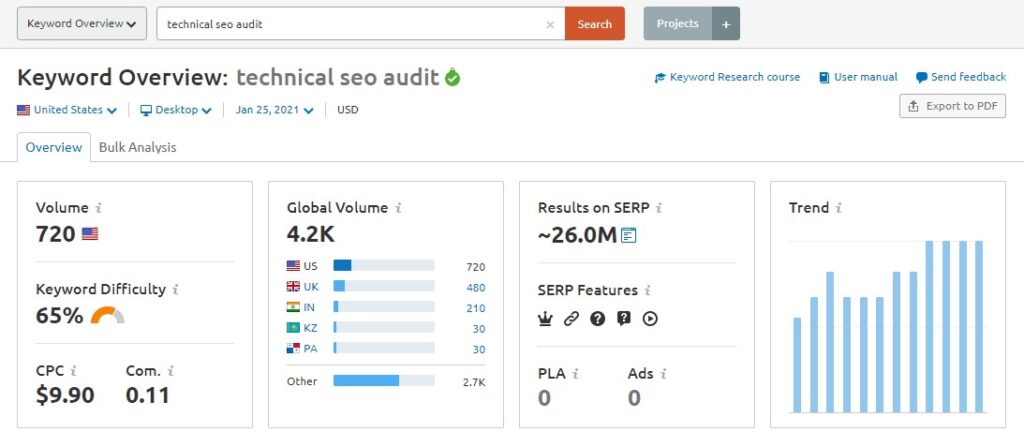
Further down the page, there will be even more data:
- Keyword Variations (any possible variation of the keyword entered), Questions (a list of question-based keywords related to the keyword entered), Related Keywords (a list of similar keywords)
- SERP Analysis (the top 100 results that appear for the keyword analyzed)
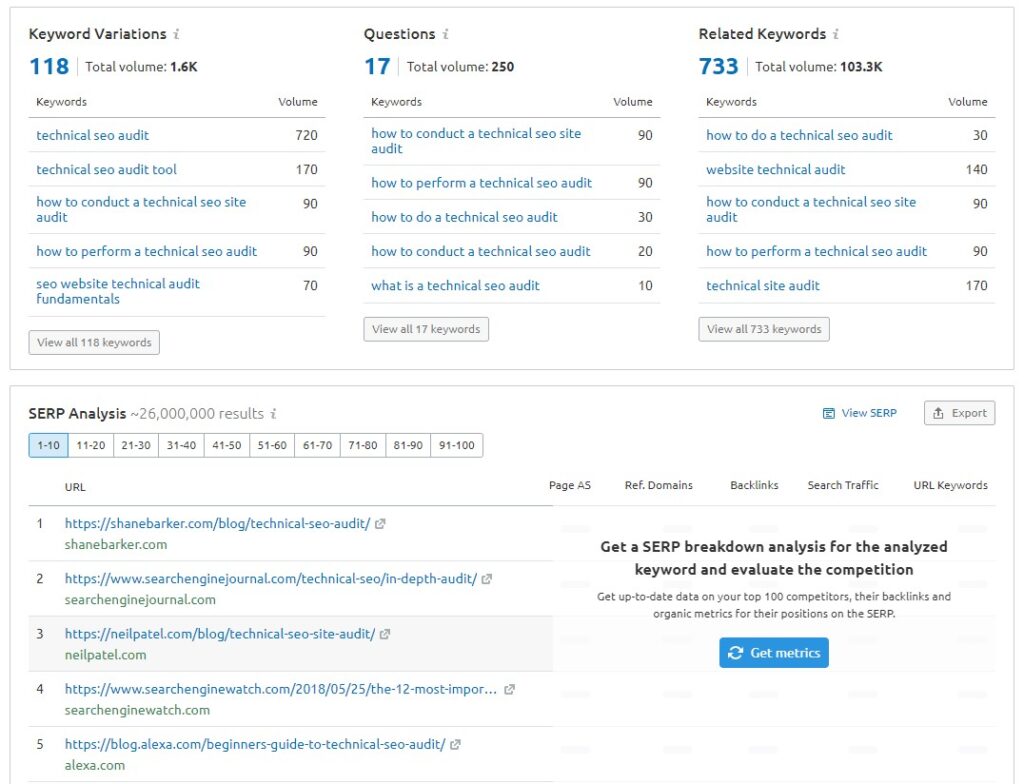
As you can see, you are getting a wealth of data on the keyword entered. You can use these keyword data to either optimize your existing content or to plan new articles based on the suggested keyword topics.
Note that on the top of the Keyword Overview you can also select a different country, switch between Desktop and Mobile search results, and change the date (to see historical data). With just one click, you can export the data to PDF. Just click on Export to PDF.

What I especially like here: I really like that Semrush goes very deep with keywords and I can get really tons of information about any keyword I enter.
Keyword Magic Tool
The Semrush Keyword Magic Tool lets you go one step further in your analysis of the keyword. To access the tool, navigate to SEO > KEYWORD RESEARCH > Keyword Magic Tool and enter the keyword you want to research.
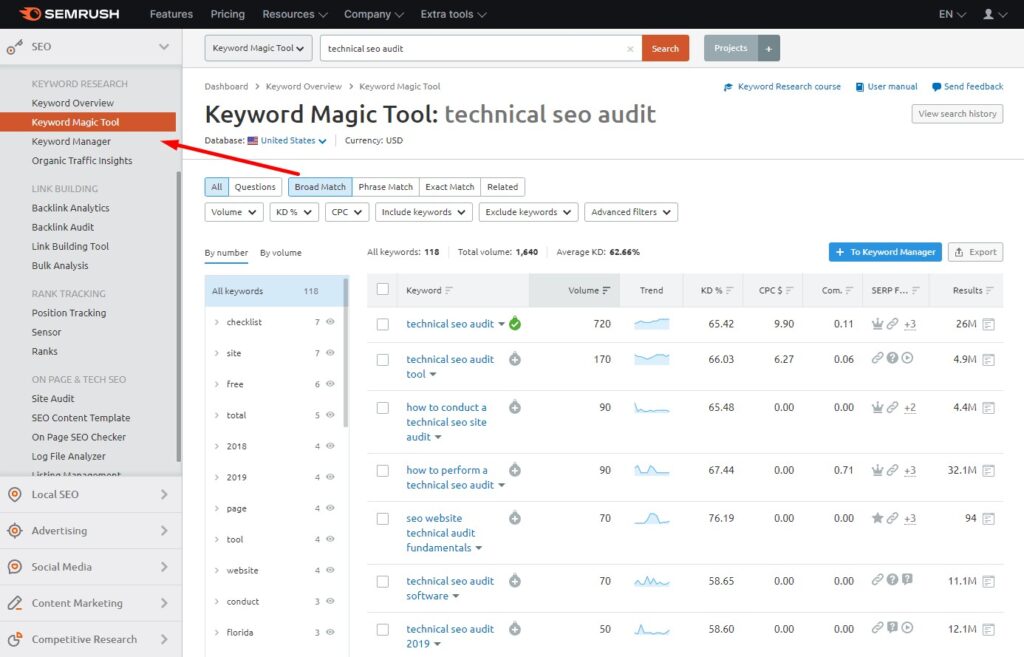
The tool will let you get hundreds, thousands, or even millions of keyword suggestions from the biggest keyword database on the market. Thanks to a very user-friendly interface, you can easily pick and filter the right keywords within a few clicks.
The Keyword Magic Tool lets you use the following filters to find the right keywords:
- All, Questions, Broad Match, Phrase Match, Exact Match, Related
- Volume, KD, CPC
- You can also include or exclude specific keywords
- Advanced filters let you specify the word count, competitive density, SERP features, and the number of results in SERP
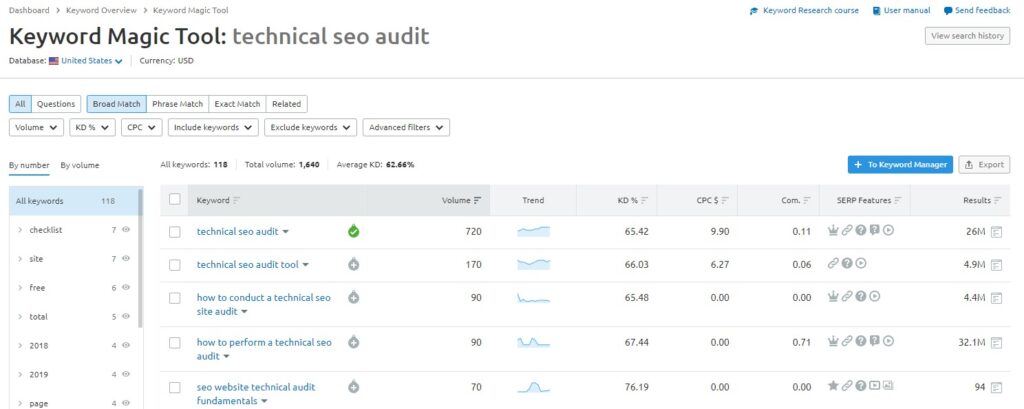
Each of the suggested keywords also has a range of useful metrics, such as Volume, Trend, KD, CPC, Competition, SERP Features, and Results. This lets you easily pick the right keywords for your website.
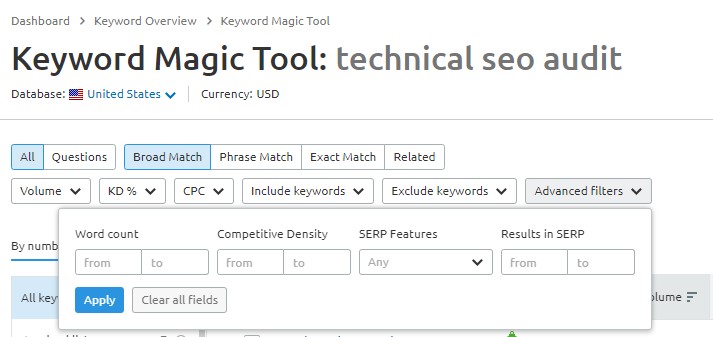
With just one click, you can export the keywords or add them to Keyword Manager. To view even more details of each keyword, simply click on the arrow down next to it and you will see its overview.
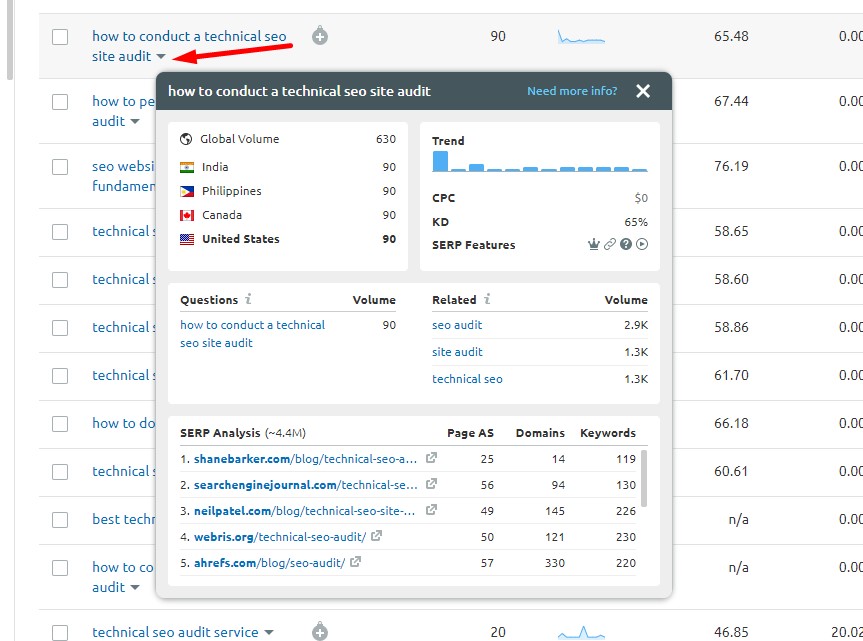
Quite awesome, isn’t it?
Keyword Manager
As its name suggests, the Semrush Keyword Manager lets you collect the keywords you are interested in from other Semrush tools, such as Keyword Overview, Keyword Magic Tool, Organic Research, and Keyword Gap. To access keyword manager, go to SEO > KEYWORD RESEARCH > Keyword Manager and either create a new list or edit an existing list.
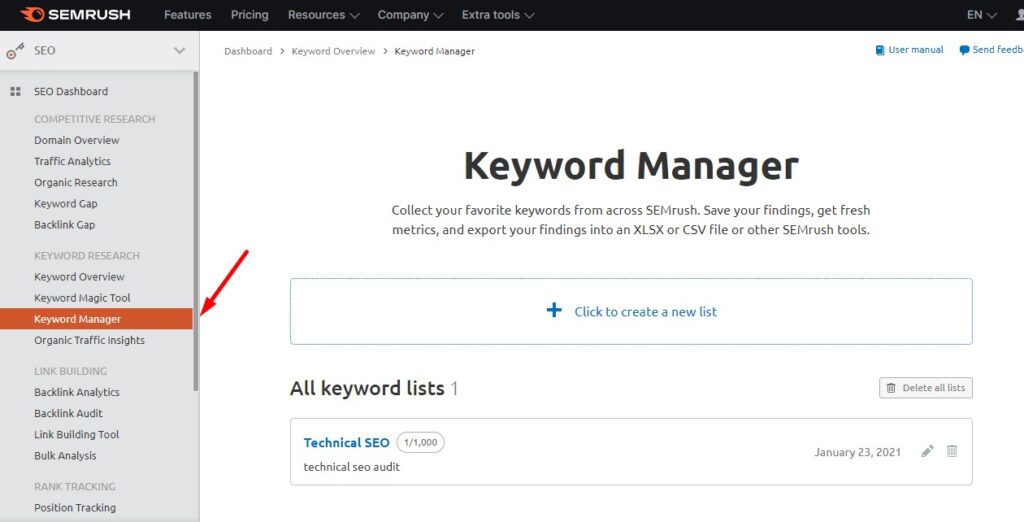
You can add new keywords to the existing keywords list by simply clicking on the plus icon next to the keyword (for example, in the Keyword Magic Tool).
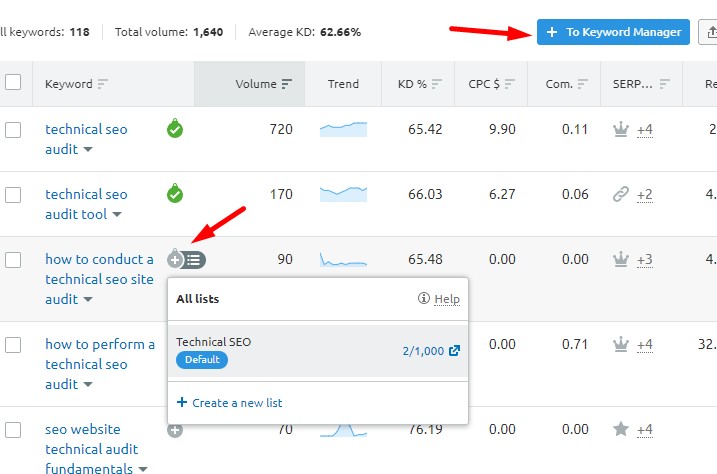
You can also add keywords to the Keyword Manager manually by creating a new list and adding keywords there or editing one of the existing keyword lists.
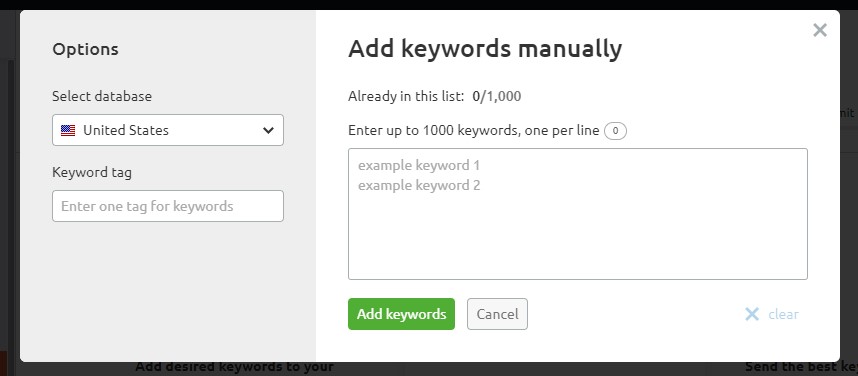
The list of keywords in the Semrush Keyword Manager, similar to the Keyword Magic Tool has various filtering and sorting options. The list also displays detailed metrics for each keyword and a total volume of all keywords. With just one click, you can update metrics and export the list.
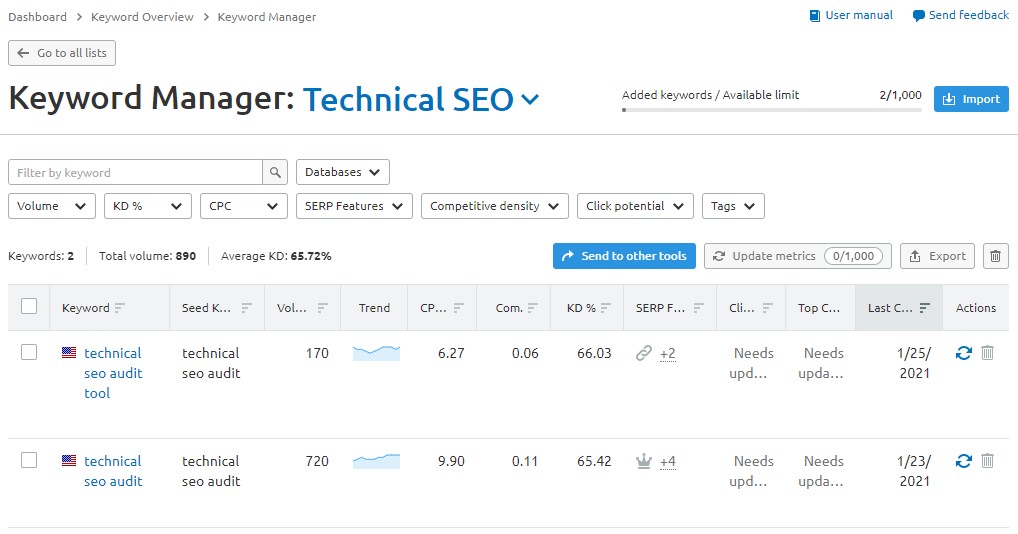
What I especially like here: I really like that each keyword list contains the total volume for all its keywords.
Rank Tracking
To ensure that your website is ranking, you need to stay updated with the progress of your website. For this, Semrush has included a Rank tracker tool in the suite that can help you track your keywords’ ranking.
SEMrush Rating
- Semrush Rating on G2 (4.5/5)
- Semrush Rating on TrustRadius (8.6/10)
- Semrush Rating on Capterra (4.6/5)






